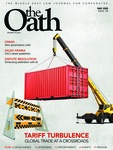Sustainability of MSMEs in the GCC

An absence of talented and experienced employees, funding difficulties and the prevailing negative economic outlook are the main challenges that affect micro, small and medium enterprises (MSMEs), according to a new report by the Pearl Initiative, a leading Gulf business-led non-profit organisation promoting a corporate culture of accountability and transparency as a key driver of competitiveness across the region.
Titled ‘Driving Value from Good Corporate Governance’, the report was compiled from the findings of a survey that analysed the state of corporate governance in more than 1,000 MSMEs across the GCC region and the key obstacles they face.
Demonstrating ambitious plans for growth, 89 per cent of respondents reported their plan to raise capital in the next one to two years, even as they face slow economic growth. On average, 50 per cent of those surveyed confirmed the existence of corporate governance documents within their firms, although only 30 per cent acknowledged the implementation of these (i.e. Delegation of Authority, Audit Reports, Risk Reports and Staff Feedback), and even less admitted to proper auditing of documents. The findings indicate clear challenges for MSMEs in the region, with business reputation, financial performance, ethics and social responsibility emerging as crucial factors in attracting investors and long-term funding.
In focusing on the current state of governance within MSMEs, the report shows that 59 percent of businesses have a board that supports in implementing good governance practices. However, 71 percent of respondents confirm that their boards are chaired by the CEO of the company, rather than an independent individual. Of those surveyed that have a formal board in place fared well in terms of diversity, with only 35 percent reporting that they do not have women on the board.
Encouragingly, the report indicated that over 70 per cent of GCC-based MSMEs capture audit reports, business plans, and financial metrics. Even so, up to 17 per cent of respondents confirmed the absence of management and executive committees as the primary task forces to facilitate the decision-making in the MSME community. Meanwhile, 59 per cent said that the CEO, or equivalent was responsible for taking most of the key operational and strategic decisions within their organisation. The survey also found that in making decisions, a lesser emphasis is placed on aspects including anti-corruption, fraud and risk management.
Comprising more than 30 questions, the extensive survey that was conducted from June to July 2017 serves as a first-of-its-kind commentary on the state of corporate governance among MSMEs in the GCC region. Reportedly, the sector accounts for over 80 per cent of the GDP across countries in the GCC and creates close to 70 per cent of all jobs. To read the full report, visit: http://www.pearlinitiative.org/en/resources.php

























































































































